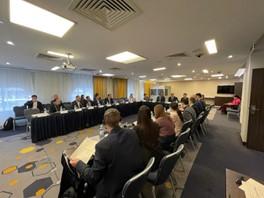
Industrial safety and the prevention of accidental water pollution were high on Kazakhstan’s agenda this week, with the Second Meeting of the Inter-institutional Working Group on Tailings Safety and the Prevention of Accidental Water Pollution (IIWG).
The meeting brought together more than 60 participants from the Ministry of Emergency Situation, the Ministry of Ecology and Natural Resources, the Ministry of Foreign Affairs as well as operators, scientific institutions, international and non-governmental organizations.
In his opening remarks, the Vice-Minister of Emergency Situations, Mr. Mereke Pshembaev, highlighted that Kazakhstan pays a lot of attention to industrial development and that there is a need to continue enhancing inter-institutional coordination on industrial safety and preventing water pollution. Furthermore, the Vice-Minister of Ecology and Natural Resources, Mr. Dosbol Bekmaganbetov, stressed that Kazakhstan was prone to almost all types of disaster risks, including technological ones, which is why the IIWG provides a unique platform to strengthen national capacities to develop measures to minimize technological risks disasters in Kazakhstan.
Coordinated activities of state bodies are crucial in order to prevent industrial accidents and minimize their potentially catastrophic consequences. At the same time, actions by and effective cooperation with operators and other stakeholders is essential, as well as information-sharing with and participation of the public.
Kazakhstan is home to many industrial activities, including tailings, which contain mining waste. In accordance with a mapping conducted by UNECE, under a Swiss-funded Project on strengthening mine tailings safety in Central Asia, 121 mine tailings facilities were identified. Of these, seven could lead to transboundary impacts, in case of an accident. Therefore, continuously ensuring the safety of existing and planned mine tailings is essential to mitigate the risks to human health and the environment, such as air, soil or water pollution.
In this regard, the meeting was dedicated to discussing recent industrial safety developments and challenges at stake for Kazakhstan, best international practices and operator initiatives. It allowed to have an open dialogue, improved knowledge sharing, information exchange and cooperation among relevant actors. In particular, participants discussed the recommendations deriving from the projects implemented under the auspices of the Convention on the Transboundary Effects of Industrial Accidents, such as alignment of Kazakhstan's national legislation with the provisions of the UNECE Convention on the Transboundary Effects of Industrial Accidents. The Working Group put a special focus on reviewing the results of project on “Development of joint measures to prevent and respond to pollution of the Syr Darya river in emergency situations (Phase I)” and agreed on the need to continue the work, in particular by developing a Joint Contingency Plan between riparian countries. It also considered the newly adopted “Road map for action to strengthen mine tailings safety within and beyond the United Nations Economic Commission for Europe region” at the 12th Conference of the Parties of the Industrial Accidents Convention. On this basis, the Working Group agreed to work towards the development of its workplan for 2023, with concrete actions to strengthen mine tailings safety and reduce the risk of accidental water pollution in Kazakhstan by national authorities, in cooperation with operators, and representatives of NGOs and academia.
The meeting was organized under the leadership of the Ministry of Emergency Situations of the Republic of Kazakhstan with the support of UNECE, thanks to financing provided by the Swiss Federal Office for the Environment, and the Organisation for Security and Co-operation in Europe (OSCE) and with the participation of the Centre for Water Initiatives Public Foundation.
Background
The Inter-institutional Working Group on Tailings Safety and the Prevention of Accidental Water Pollution (IIWG) is a platform for inter-agency coordination and cooperation among experts from the industrial safety, water and other sectors regarding the prevention and mitigation of accidental water pollution from industrial activities, in particular mine tailings. It was established in January 2022 by a decree of the Ministry of Emergency Situations and held its first meeting in February 2022. Following today's second meeting, the third meeting is planned for the first quarter of 2024. UNECE, through the secretariat of the Convention on the Transboundary Effects of Industrial Accidents, supported the establishment of the working group and holding of the first two meetings, thanks to funding provided by the Swiss Federal Office for the Environment. Since 2001, Kazakhstan has been a Party to the Industrial Accidents Convention and since 2004 benefitting from the Convention's Assistance and Cooperation Programme.